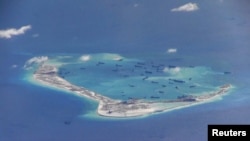China's Defense Ministry Thursday accused the United States of "militarizing" the South China Sea by staging patrols and joint military drills there, leading to raised tensions in the disputed region.
China Defense spokesman Yang Yujun said Beijing has been angered by U.S. Navy and Air Force forays through waters it claims as its own, strengthened military alliances with the Philippines and others, and frequent military exercises in the region.
Yang said the actions are creating risks of incidents in the air and at sea.
"The Chinese side expresses its serious concern over U.S. activities to militarize the South China Sea region," he said. "Such actions taken by the U.S. side would inevitably arouse suspicion from others that, does the U.S. want nothing better than chaos in the region?"
Yang's remarks were prompted by comments made last week by Admiral Harry Harris, head of the U.S. Pacific Command, who criticized Chinese island-building in the disputed waters.
In the past year, China has stepped up its creation of artificial islands in the South China Sea, alarming neighbors and provoking U.S. criticism.
Security leaders
Harris, speaking at a Colorado gathering of U.S. national security leaders hosted by the Aspen Instititue, warned China that its aggressive build-up could undermine international norms that have long supported the global economy and political order.
More than $5.3 trillion in global sea-based trade relies on unimpeded sea lanes through the South China Sea, Harris said. That is made possible through regional partners' recognition of international law and protection of freedom of navigation, he said.
Harris also argued the newly created islands are clearly intended for China’s military use, possibly as forward operating bases.
Speaking at a monthly news conference, Yang said China rejected the claims and accused the U.S. of ulterior motives.
"The U.S. side disregards and distorts the facts and plays up China's military threat to sow discord between China and the littoral states in the South China Sea. We firmly oppose such actions," Yang said.
Earlier this month, Chinese military officials also issued a warning to the U.S. over reconnaissance flights being carried out in the region after Admiral Scott Swift, commander of the U.S. Pacific Fleet, said he had participated in one.
Swift said at the time the flight allowed him to see "first-hand" new operational capabilities in the fleet, although he gave no specifics of the flight.
Disputed waters
China and five other claimants – Taiwan, Vietnam, Malaysia, Brunei and the Philippines – have competing claims to all or parts of the South China Sea, home to rich fishing grounds, potentially significant mineral reserves and some of the world's most crucial shipping lanes.
Harris said the amount of land reclaimed by Vietnam, Malaysia, the Philippines and Taiwan over the past 45 years totaled a mere 40 hectares (100 acres), a fraction of the more than 1,200 hectares (3,000 acres) reclaimed by China in the last 18 months alone.
“The South China Sea is front and center in the tug-of-war between the majority of regional nations that want to maintain the status quo and China that wants to change it to suit its narrow self-interest,” he said at the security panel discussion July 24.
Washington has demanded China halt land reclamation and militarization of the disputed area and to pursue a peaceful resolution with other regional claimants according to international law. Beijing has said the outposts will have undefined military purposes, as well as help with maritime search and rescue, disaster relief and navigation.
The South China Sea is likely to feature prominently at next week's security meeting in Malaysia, attended by Southeast Asia and Chinese foreign ministers and U.S. Secretary of State John Kerry.
On Thursday, Philippine military head General Hernando Iriberri told journalists in Manila it was investigating reports China had reclaimed three more reefs in the South China Sea as well as activities in Scarborough Shoal.
Some material for this report came from AP and Reuters.








